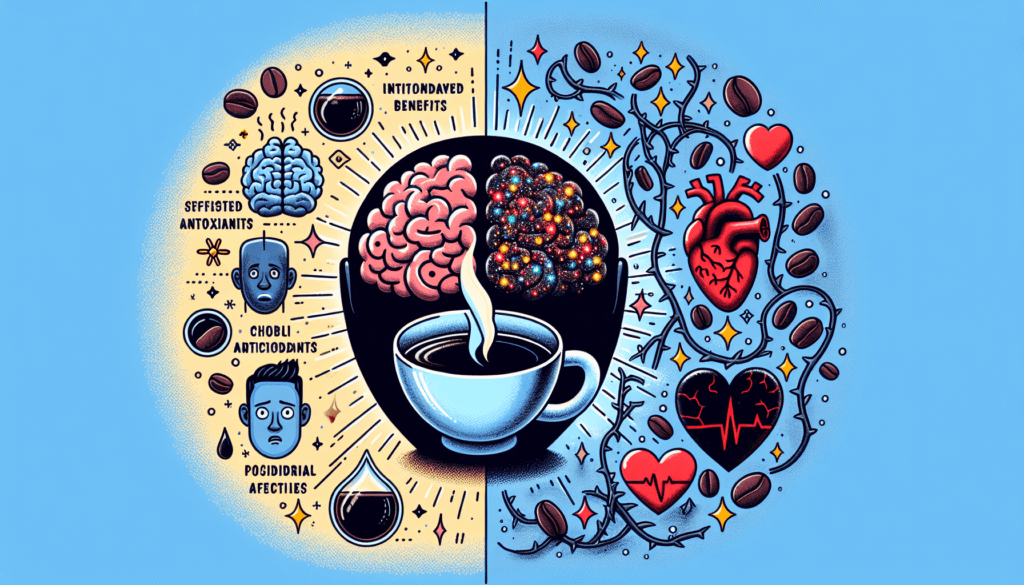If you’ve ever wondered whether your love for coffee is doing more harm than good, then it’s time to put those worries to rest. This article seeks to shed light on the age-old question: Is coffee actually healthy for you? With its rich aroma and energizing effects, coffee has become a staple in the daily routines of millions of people worldwide. But is it beneficial for our health or is it a guilty pleasure we should indulge in moderation? Strap in as we explore the potential health benefits and risks associated with everyone’s favorite brew. Whether you’re a coffee aficionado or simply curious, we’ve got the answers you’re looking for.
Overview of Coffee
The popularity of coffee
Coffee is one of the most popular beverages in the world, enjoyed by millions of people every day. Its rich and aromatic flavor, combined with its energizing effects, has made it a beloved drink across cultures and continents. The enticing aroma of freshly brewed coffee can instantly lift one’s mood and promote a sense of comfort and well-being. Whether it’s a morning pick-me-up, a social ritual, or a necessary fuel for a busy day, coffee holds a special place in many people’s lives.
Components of coffee
Coffee is primarily made from roasted coffee beans, which contain numerous bioactive compounds. These compounds include caffeine, antioxidants, and various other beneficial substances. Caffeine is the most well-known component of coffee and is responsible for its stimulating effects. Antioxidants, on the other hand, help protect the body from free radicals, which can otherwise damage cells and contribute to the development of diseases. Additionally, coffee also contains minerals such as magnesium, potassium, and manganese, as well as vitamins B2 and B3.
Nutritional value of coffee
While coffee itself does not provide significant amounts of nutrients, it can contribute to an overall nutrient intake when consumed as part of a balanced diet. A standard cup of black coffee contains virtually no calories, fats, or carbohydrates. However, the addition of milk, sugar, or other sweeteners can add calories and affect its nutritional profile. Nonetheless, when consumed in moderation and without excessive additives, coffee can be a refreshing and low-calorie beverage option.
Health Benefits of Coffee
Antioxidant properties
One of the key health benefits of coffee is its rich antioxidant content. Antioxidants are substances that help reduce oxidative stress in the body, thereby protecting against cellular damage. Coffee is a significant source of antioxidants, and studies have indicated that coffee consumption may help lower the risk of chronic diseases such as cardiovascular disease, certain types of cancer, and neurodegenerative disorders.
Improved cognitive function
Coffee’s active ingredient, caffeine, has been shown to have a positive impact on cognitive function. It can enhance alertness, concentration, and reaction time. By blocking the neurotransmitter adenosine, which promotes sleep and relaxation, caffeine promotes wakefulness and mental alertness. Moderate coffee consumption can therefore help improve cognitive performance and productivity.
Reduced risk of certain diseases
Regular coffee consumption has been associated with a reduced risk of several diseases. Studies have shown that coffee drinkers have a lower risk of developing type 2 diabetes, liver disease, and certain types of cancer, including liver and colorectal cancer. These benefits may be attributed to the presence of bioactive compounds in coffee, such as chlorogenic acids and polyphenols, which have been found to have anti-inflammatory and anticancer properties.
Enhanced physical performance
Coffee has long been recognized for its ability to enhance physical performance. Caffeine stimulates the central nervous system, leading to increased alertness, reduced fatigue, and improved endurance. This can be particularly beneficial for athletes and individuals engaging in prolonged or high-intensity physical activities. Additionally, caffeine has been shown to increase fat oxidation and can thus be utilized as an aid for weight management and exercise performance.

Potential Risks of Coffee Consumption
Caffeine dependence
While moderate coffee consumption is generally considered safe, excessive intake can lead to caffeine dependence. Caffeine is a stimulant that affects the central nervous system. Regular consumption of large amounts of caffeine can lead to tolerance, withdrawal symptoms, and cravings when caffeine is not consumed. It is important to be mindful of your caffeine intake and avoid excessive consumption to prevent dependence and associated negative effects.
Impact on sleep quality
As a stimulant, caffeine can interfere with sleep quality and quantity. Consuming coffee too close to bedtime can disrupt the natural sleep-wake cycle and make it harder to fall asleep. Even moderate amounts of caffeine can have a noticeable impact on sleep, particularly for individuals who are sensitive to its effects. It is recommended to avoid consuming coffee in the evening, especially if you have trouble with sleep or are prone to insomnia.
Gastrointestinal issues
For some individuals, coffee consumption can lead to gastrointestinal issues such as acid reflux, heartburn, or an upset stomach. This can be attributed to the acidity of coffee, as well as its stimulant effects on the digestive system. If you experience digestive discomfort after drinking coffee, it may be helpful to opt for lower-acid coffee varieties or consider adding milk or non-dairy alternatives to mitigate these effects.
Increased heart rate and blood pressure
Due to its stimulating properties, coffee can cause a temporary increase in heart rate and blood pressure. This effect is generally mild and transient, but individuals with underlying cardiovascular conditions may be more susceptible to these changes. If you have a heart condition or concerns about your blood pressure, it is advisable to consult with a healthcare professional to determine the appropriate level of coffee consumption for you.
Coffee and Mental Health
Effects on depression and suicide risk
Several studies have explored the relationship between coffee consumption and mental health outcomes. Some studies suggest that regular coffee consumption may be associated with a lower risk of depression and suicide. The caffeine and antioxidant content in coffee may have mood-enhancing effects and protect against certain biochemical changes associated with depression. However, more research is needed to establish a clear causal relationship between coffee and mental health outcomes.
Association with reduced risk of Parkinson’s disease
Parkinson’s disease is a neurodegenerative disorder that affects movement and can have significant impacts on quality of life. Multiple studies have found an association between coffee consumption and a reduced risk of developing Parkinson’s disease. The exact mechanisms are not yet fully understood, but caffeine, as well as other components in coffee, may have neuroprotective effects that help preserve the dopaminergic neurons affected by Parkinson’s disease.
Possible link to lower risk of Alzheimer’s disease
Alzheimer’s disease is the most common form of dementia, characterized by cognitive decline and memory impairment. Some research suggests that regular coffee consumption may help lower the risk of developing Alzheimer’s disease. Again, caffeine and other bioactive compounds in coffee have been theorized to play a role in reducing the accumulation of amyloid beta plaques, a hallmark of Alzheimer’s disease. However, more studies are needed to confirm this potential association.
Impact on anxiety and stress levels
The effects of coffee on anxiety and stress levels can vary among individuals. While moderate coffee consumption can increase alertness and improve mood, excessive intake or high sensitivity to caffeine may lead to jitteriness and increased feelings of anxiety. It is important to pay attention to your body’s response to coffee and make adjustments based on your individual tolerance levels. If you experience heightened anxiety or stress after consuming coffee, it may be beneficial to reduce your intake or opt for decaffeinated coffee instead.

Coffee and Physical Health
Effect on cardiovascular health
The impact of coffee on cardiovascular health has been a topic of extensive research. While moderate coffee consumption is generally considered safe for most individuals, excessive intake may increase the risk of cardiovascular events in individuals with pre-existing conditions or high sensitivity to caffeine. However, studies have also suggested that regular coffee consumption, in moderation, may be associated with a lower risk of heart disease, stroke, and heart failure. The cardioprotective effects of coffee may be attributed to its antioxidant and anti-inflammatory properties.
Influence on liver function and disease
The liver plays a crucial role in detoxification and metabolism. Coffee consumption has been associated with a reduced risk of liver disease, particularly liver cirrhosis and hepatocellular carcinoma. The protective effect of coffee may be influenced by its antioxidant and anti-inflammatory properties, as well as its potential to modulate enzymes involved in liver metabolism. However, it is important to note that excessive alcohol consumption can negate the potential benefits of coffee on liver health.
Association with reduced risk of certain cancers
Coffee has been the subject of numerous studies investigating its potential impact on cancer risk. The findings suggest that coffee consumption may be associated with a reduced risk of certain types of cancer, including liver, colorectal, and endometrial cancer. The exact mechanisms behind these associations are not yet fully understood, but the antioxidant and anti-inflammatory properties of coffee, as well as its ability to modulate insulin levels, have been proposed as potential factors.
Effect on metabolic rate and weight management
Coffee’s stimulating effects can increase metabolic rate and promote fat oxidation, potentially aiding in weight management efforts. Caffeine has been shown to increase thermogenesis, the process by which the body produces heat and burns calories. However, any potential weight loss effects of coffee are likely to be modest and may vary among individuals. Additionally, consuming coffee with added sugars, syrups, or high-calorie creamers can negate its potential benefits and contribute to weight gain.
Coffee and Chronic Diseases
Potential protective effect against type 2 diabetes
Type 2 diabetes is a chronic condition characterized by high blood sugar levels, typically due to insulin resistance. Moderate coffee consumption has been associated with a lower risk of developing type 2 diabetes. The antioxidants and other bioactive compounds in coffee may help improve insulin sensitivity, reduce inflammation, and regulate blood sugar levels. However, it is important to note that excessive consumption of highly sweetened coffee beverages can have the opposite effect and increase the risk of diabetes.
Impact on liver disease and cirrhosis
Coffee has shown consistent associations with a reduced risk of liver disease, including liver cirrhosis. Cirrhosis is a late-stage liver disease characterized by scarring and impaired liver function. The mechanisms behind coffee’s protective effect on the liver are not yet fully understood, but it may involve its ability to reduce inflammation, enhance liver enzymes, and modify the progress of liver fibrosis. It is worth noting that these benefits apply primarily to black coffee or coffee without added sugars or alcohol.
Association with decreased risk of colorectal cancer
Colorectal cancer is the third most common cancer worldwide, and several studies have explored the relationship between coffee consumption and its risk. Regular coffee consumption has been associated with a modestly reduced risk of colorectal cancer. The potential protective effects of coffee may be attributed to its antioxidant properties and ability to modulate insulin and bile acid metabolism. However, it is essential to maintain a healthy lifestyle and diet alongside moderate coffee consumption for overall cancer prevention.
Possible relationship with lower risk of stroke
Stroke is a serious medical condition that occurs when the blood flow to the brain is interrupted. Some studies have indicated that regular coffee consumption may be associated with a reduced risk of stroke. The exact mechanisms driving this association are not yet clear, but it may involve coffee’s ability to improve blood vessel function, regulate blood pressure, and modulate inflammation. However, more research is needed to fully understand the relationship between coffee and stroke risk.

Caffeine Content and Other Considerations
Caffeine content in different types of coffee
The caffeine content in coffee can vary depending on the type of coffee beans, the brewing method, and the serving size. As a general guideline, an 8-ounce cup of brewed coffee typically contains between 80 to 100 milligrams of caffeine. However, specialty coffees, such as espresso-based drinks or flavored varieties, may have higher caffeine content. It is important to be aware of your caffeine intake, especially if you are sensitive to its effects or have health conditions that may be exacerbated by caffeine.
Coffee consumption during pregnancy
Pregnant women are often advised to limit their caffeine intake, as excessive caffeine can cross the placenta and affect fetal development. The recommended caffeine intake during pregnancy is typically around 200 milligrams per day, equivalent to approximately one 12-ounce cup of coffee. It is important to note that caffeine can also be found in other sources, such as tea and chocolate. Expectant mothers should consult with their healthcare provider for personalized recommendations regarding coffee consumption during pregnancy.
Coffee and breastfeeding
Caffeine from coffee can be transferred to breast milk, and newborn infants have limited ability to metabolize caffeine. While moderate coffee consumption is generally considered safe during breastfeeding, it is advisable to limit caffeine intake to moderate levels to minimize potential effects on infants. It is also essential to be attentive to any signs of caffeine sensitivity in the nursing baby, such as irritability or sleep disturbances.
Interactions with medications
Coffee, particularly high doses of caffeine, can interact with certain medications and affect their efficacy or increase their side effects. Some medications, such as certain antibiotics, antidepressants, and antipsychotics, can be affected by caffeine. Additionally, caffeine can enhance the effects of certain over-the-counter medications, such as pain relievers or decongestants. It is important to discuss your coffee consumption with your healthcare provider to ensure it does not interfere with any medications you may be taking.
Individual Variations and Sensitivity to Coffee
Genetic factors influencing coffee metabolization
The way individuals metabolize and respond to coffee can vary depending on genetic factors. Certain genes involved in caffeine metabolism, such as CYP1A2, can influence an individual’s ability to metabolize caffeine efficiently. Some people are considered slow caffeine metabolizers, meaning they are more likely to experience the stimulant effects of caffeine for a longer duration. Others may be fast metabolizers and process caffeine more quickly. Understanding your genetic predispositions can help guide your coffee consumption patterns to suit your individual needs.
Effects of caffeine on sleep for different individuals
Sleep sensitivity to caffeine can vary greatly among different individuals. While some people may be able to consume coffee in the evening without experiencing sleep disruptions, others may be more sensitive to its effects. The half-life of caffeine, or the time it takes for the body to eliminate half of the caffeine consumed, can range from three to five hours. It is essential to listen to your body and adjust your coffee consumption accordingly to ensure optimal sleep quality.
Sensitivity to coffee and its symptoms
Coffee sensitivity can manifest in various ways among individuals. Some people may experience jitteriness, anxiety, or gastrointestinal discomfort after consuming even small amounts of coffee. Others may have sensitivity to specific components in coffee, such as caffeine or certain acids. It is important to be mindful of your body’s response and make adjustments to your coffee consumption based on your individual tolerance levels and any adverse symptoms you may experience.
Decaffeinated coffee as an alternative
For individuals who are sensitive to caffeine or wish to limit their caffeine intake, decaffeinated coffee can serve as an alternative. Decaffeinated coffee is made by removing most of the caffeine content from the coffee beans through various processes. While it still retains the rich flavor and aroma of coffee, decaf coffee typically contains only a small fraction of the caffeine found in regular coffee. It is essential to note that decaf coffee is not entirely caffeine-free and can still have trace amounts of caffeine.

Coffee versus Other Beverages
Comparison with tea
Coffee and tea are two popular beverages that offer different flavor profiles and caffeine content. Coffee generally has a bolder and more robust flavor, while tea can be more delicate and varied in taste. When it comes to caffeine content, coffee typically contains more caffeine per serving than tea. However, the specific caffeine content can vary depending on factors such as brewing method and variety of tea. Both coffee and tea have their own unique health benefits and can be enjoyed as part of a healthy lifestyle, depending on individual preferences.
Contrast with energy drinks
Energy drinks and coffee are both known for their stimulating effects, but they differ in terms of ingredients and intended use. While coffee primarily contains caffeine and natural antioxidants, energy drinks often contain additional substances such as taurine, B vitamins, and high levels of sugar. Energy drinks are typically formulated to provide a quick burst of energy, whereas coffee offers a more gradual and sustained effect. It is important to note that excessive consumption of energy drinks can have negative health effects, and coffee is generally considered a safer option when consumed in moderation.
Different effects compared to alcoholic beverages
Coffee and alcoholic beverages offer contrasting effects on the body and mind. While coffee acts as a stimulant and promotes wakefulness, alcohol is a depressant that can induce sedation and relaxation. Excessive alcohol consumption can have numerous negative health effects, including liver damage, impaired cognitive function, and addiction. Coffee, on the other hand, can provide temporary alertness and improved cognitive performance, primarily due to its caffeine content. It is important to consume alcohol and coffee responsibly and be mindful of their respective effects on physical and mental well-being.
Healthier alternatives to coffee
For individuals who do not enjoy or tolerate coffee well, there are several healthier alternatives available. Herbal teas, such as chamomile, peppermint, or green tea, offer a variety of flavors and potential health benefits without the caffeine content of coffee. Other options include naturally caffeine-free beverages like rooibos tea, lemon water, or infused fruit water. These alternatives can provide refreshing and hydrating options while still offering a pleasant beverage experience.
Conclusion
In conclusion, coffee is a widely enjoyed beverage that can offer a range of potential health benefits when consumed in moderation. Its antioxidant properties, ability to improve cognitive function, potential protective effects against certain diseases, and enhancement of physical performance make it a popular choice for many individuals. However, it is essential to be aware of potential risks and side effects, such as caffeine dependence, impacts on sleep quality, gastrointestinal issues, and temporary increases in heart rate and blood pressure.
Coffee may also have effects on mental health, with potential associations with reduced risk of depression, Parkinson’s disease, and Alzheimer’s disease. When it comes to physical health, coffee’s influence on cardiovascular health, liver function, and reduced risk of certain cancers deserves attention. It is also important to consider individual variations in coffee sensitivity, genetic factors influencing metabolization, and the availability of decaffeinated coffee as an alternative.
When comparing coffee to other beverages, such as tea, energy drinks, and alcoholic beverages, it is essential to consider the specific effects and potential health implications of each. For those who prefer alternatives to coffee, a variety of caffeine-free options exist that can still provide enjoyment and potential health benefits.
In summary, coffee can be a part of a balanced and healthy lifestyle when consumed in moderation, taking individual differences and sensitivities into account. By appreciating the flavor, aroma, and potential health benefits of coffee while considering personal preferences and health considerations, you can enjoy this popular beverage with confidence.



